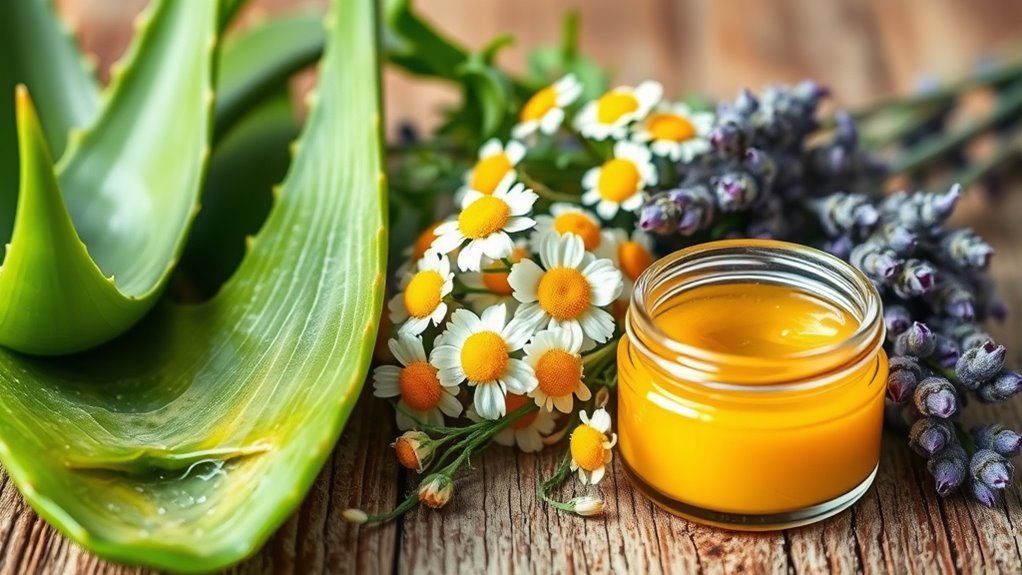If you’re looking for herbal remedies for eczema and skin inflammation, try soothing aloe vera to calm irritation, while chamomile and calendula reduce redness and swelling. Neem supports healing and prevents infections, and licorice root along with turmeric helps fight inflammation and flare-ups. Oatmeal offers gentle relief by soothing and moisturizing your skin. Keep exploring to discover how these natural ingredients can work together to support healthier, calmer skin.
Key Takeaways
- Aloe Vera soothes irritated skin, reduces redness, and promotes healing when applied regularly to eczema-affected areas.
- Chamomile’s anti-inflammatory properties help calm swelling, redness, and itching associated with skin inflammation.
- Calendula supports tissue repair and decreases inflammation, aiding faster recovery of sensitive or inflamed skin.
- Neem’s antiseptic and anti-inflammatory effects help prevent infection and reduce eczema flare-ups.
- Incorporating turmeric and curcumin offers natural anti-inflammatory benefits to calm skin and prevent flare-ups.
Aloe Vera: Nature’s Soothing Gel for Skin
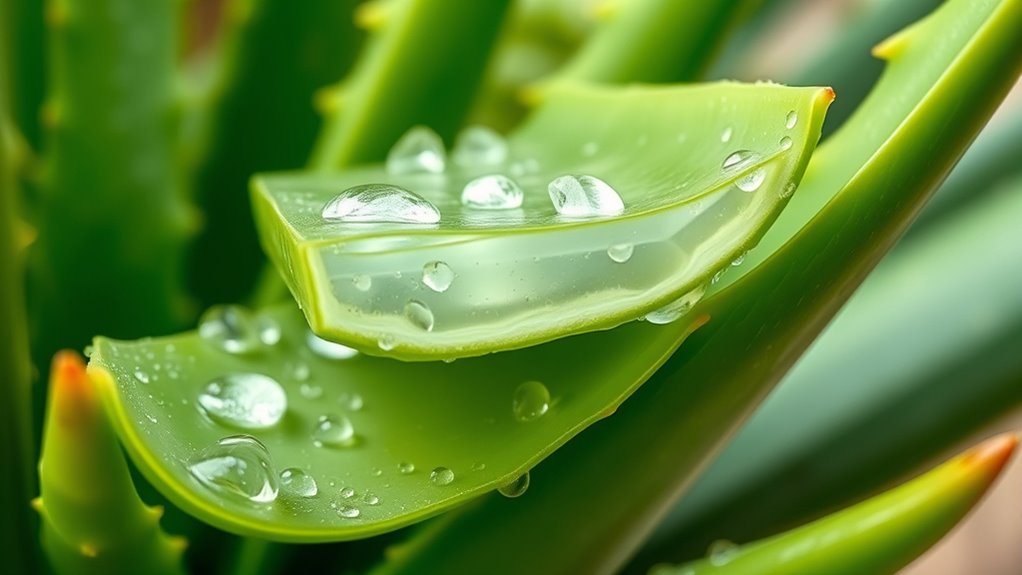
Have you ever experienced the calming sensation of applying aloe vera on irritated skin? If so, you already know how quickly it can soothe redness and reduce inflammation. Aloe vera contains compounds like glucomannan and acemannan that promote healing and moisturize deeply. Its cooling properties provide immediate relief from itching and discomfort, making it a popular natural remedy for eczema flare-ups. You can use fresh aloe vera gel directly from the plant or opt for products with high aloe content, ensuring you avoid added chemicals. Applying a thin layer of aloe vera twice daily helps keep your skin hydrated and supports the healing process. Its gentle, natural properties make it an excellent choice for calming irritated skin without causing further irritation.
Chamomile: Gentle Relief From Inflammation

Chamomile’s natural anti-inflammatory properties can help reduce swelling and redness on your skin. It also soothes irritation, providing relief from discomfort. Plus, its calming effects can help ease stress that might worsen eczema symptoms.
Anti-inflammatory Properties
Because inflammation often worsens eczema symptoms, finding natural remedies that calm this response is essential. Chamomile is renowned for its anti-inflammatory properties, making it a gentle yet effective option. It contains compounds like bisabolol and chamazulene that reduce swelling and redness, promoting quicker healing. Applying chamomile topically or drinking chamomile tea can help soothe inflamed skin. To illustrate its benefits, here’s a quick comparison:
| Benefit | How It Works |
|---|---|
| Reduces redness | Calms blood vessels and skin tissue |
| Eases swelling | Lowers inflammatory response |
| Soothes irritated skin | Provides gentle relief |
| Accelerates healing | Promotes tissue repair |
| Natural and safe | Suitable for sensitive skin |
Incorporating chamomile into your routine offers a natural way to combat inflammation and support healthier skin.
Soothing Skin Irritation
When skin becomes irritated from eczema, finding gentle relief is essential to prevent further discomfort and flare-ups. Chamomile is a natural remedy known for its soothing properties. Applying chamomile extract or using chamomile-infused compresses can calm inflamed skin and reduce redness. Its anti-inflammatory compounds help to ease itching and irritation without harsh chemicals. You can make a chamomile tea, let it cool, and then gently apply it to affected areas with a soft cloth. Additionally, chamomile creams or ointments are available for targeted relief. Regular use can help maintain skin comfort and prevent irritation from worsening. Remember, always patch-test new remedies to ensure your skin doesn’t react negatively, and consult with a healthcare professional if symptoms persist.
Natural Calming Effects
Herbal remedies like chamomile not only soothe irritated skin but also offer natural calming effects that help manage inflammation. When you use chamomile, whether as a tea, topical infusion, or compress, it calms your skin and eases redness. Its anti-inflammatory properties reduce swelling and irritation, providing gentle relief during flare-ups. Chamomile contains compounds like apigenin that help relax your skin and reduce stress-related symptoms. Regular use can promote a sense of calm, making it easier to cope with eczema discomfort. You’ll notice that chamomile’s soothing effects extend beyond skin benefits, helping to ease your mind and body. Incorporating chamomile into your routine offers a natural way to calm inflammation, soothe irritation, and restore your skin’s balance effectively.
Calendula: Healing Properties for Sensitive Skin
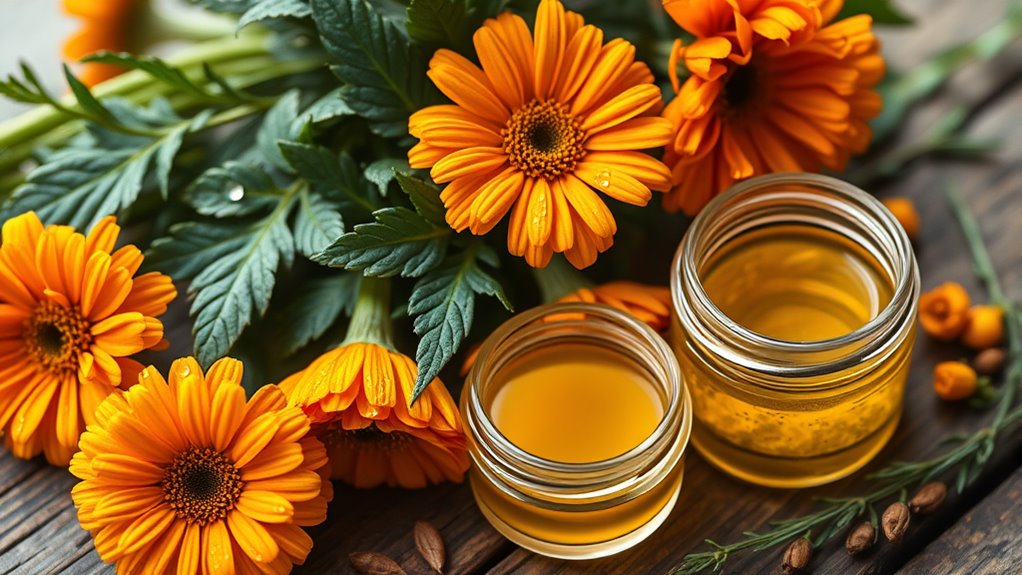
Calendula has long been celebrated for its soothing and healing properties, making it a popular choice for those with sensitive skin and eczema. When you apply calendula ointments or creams, you support your skin’s natural healing process, reducing redness and irritation. Its anti-inflammatory compounds help calm inflamed areas, while antioxidants promote tissue repair. Calendula also encourages new cell growth, which speeds up recovery from flare-ups. You can use it as a gentle topical treatment, either directly or as part of a herbal infusion. Because it’s gentle and non-irritating, calendula is suitable for even the most delicate skin types. Regular use can help soothe itching, diminish swelling, and restore your skin’s natural barrier, providing relief and fostering healthier skin over time.
Neem: Natural Antiseptic and Anti-Inflammatory Benefits
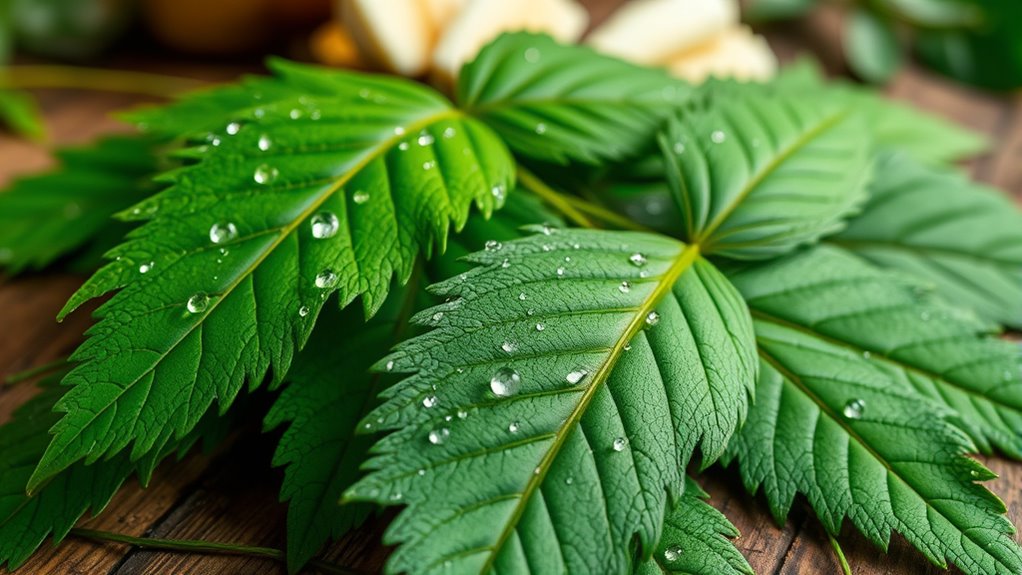
Neem has been valued for centuries for its potent antiseptic and anti-inflammatory properties, making it a powerful ally in managing eczema. Its natural compounds help reduce redness, swelling, and itching by calming irritated skin. You can apply neem oil or use neem-based creams to target affected areas directly. Neem’s antiseptic qualities also help prevent infections that can worsen eczema symptoms. Additionally, its anti-inflammatory effects soothe the skin and promote healing. Regular use may improve skin barrier function, reducing flare-ups over time. Because neem is gentle yet effective, it’s suitable for sensitive skin types. Incorporate neem into your skincare routine to harness its natural healing power and support healthier, calmer skin. Just guarantee you’re using pure, high-quality neem products for the best results.
Licorice Root: Reducing Redness and Irritation
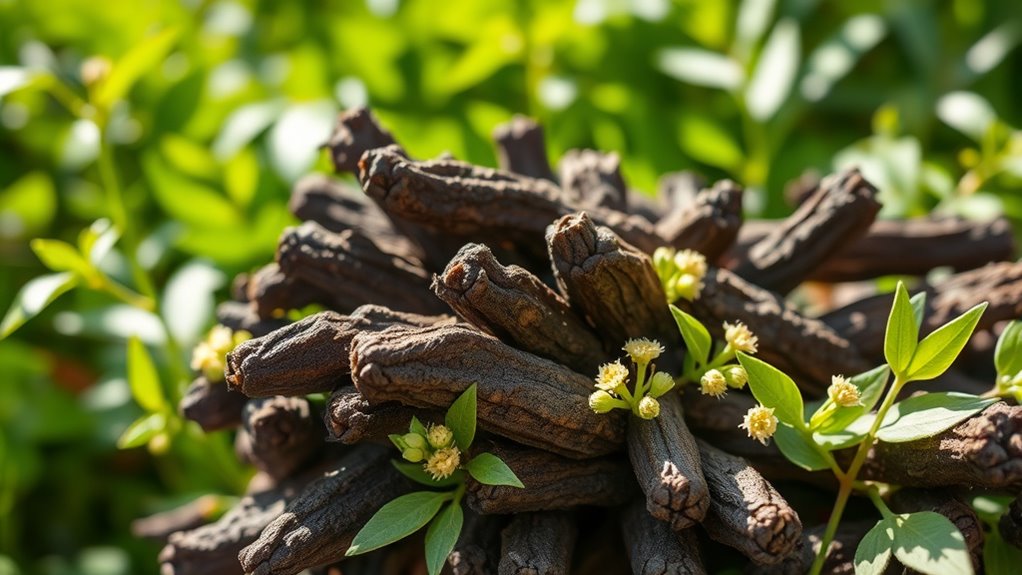
If you’re looking to soothe redness and irritation caused by eczema, licorice root offers a potent natural solution. It contains glycyrrhizin, which helps reduce inflammation and calm inflamed skin. Applying licorice extract or using creams with licorice can diminish redness and irritation effectively. It also helps strengthen the skin’s barrier, preventing further flare-ups. You can find licorice root in topical forms like creams, ointments, or serums, making it easy to incorporate into your skincare routine. Be cautious if you have high blood pressure or kidney issues, as excessive use might cause side effects. Always conduct a patch test before applying liberally. With consistent use, licorice root can provide relief from the discomfort and visible redness associated with eczema.
Turmeric: Powerful Anti-Inflammatory Effects
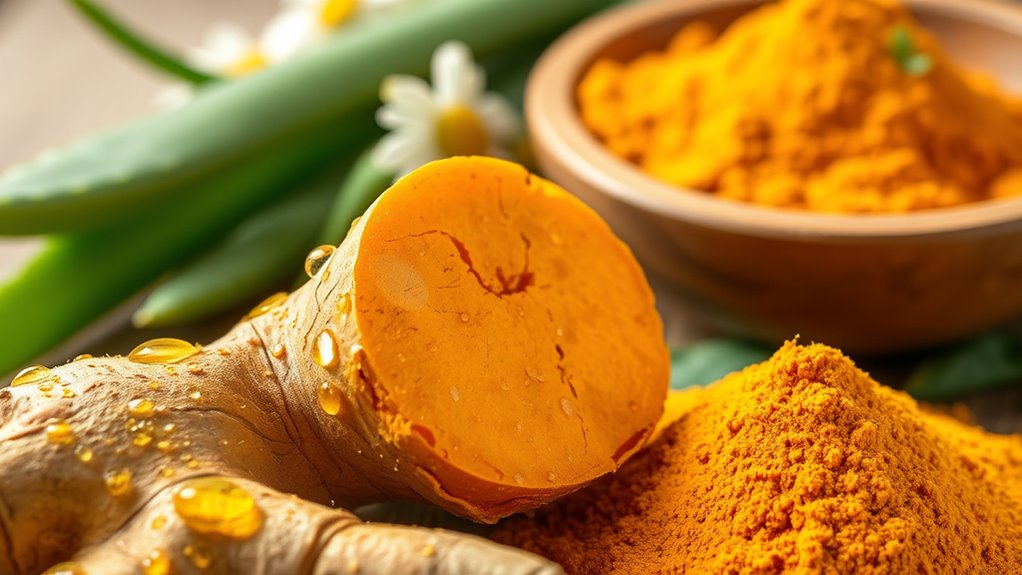
Turmeric is known for its strong anti-inflammatory properties that can help soothe eczema symptoms. Curcumin, the active compound in turmeric, offers numerous skin benefits when used correctly. You’ll want to learn how to incorporate turmeric safely to maximize its healing effects.
Anti-Inflammatory Properties of Turmeric
Because inflammation plays a key role in eczema flare-ups, incorporating turmeric into your skincare routine can offer significant relief. Turmeric contains curcumin, a compound known for its potent anti-inflammatory properties. When applied topically or taken as a supplement, turmeric can help reduce redness, swelling, and irritation associated with skin inflammation. Its natural compounds inhibit inflammatory pathways, calming irritated skin and preventing flare-ups. Unlike some medications, turmeric offers a gentle, natural alternative that supports your skin’s healing process. Consistent use may improve skin barrier function and decrease the frequency of eczema outbreaks. However, it’s essential to use turmeric correctly—either as a paste, in creams, or as part of your diet—to maximize its anti-inflammatory benefits and keep your skin calmer and healthier.
Curcumin’s Skin Benefits
Curcumin, the active compound in turmeric, delivers powerful anti-inflammatory effects that can benefit your skin. It helps reduce redness, swelling, and irritation associated with eczema and other inflammatory skin conditions. By inhibiting inflammatory pathways, curcumin can soothe inflamed skin and promote healing. Its antioxidant properties protect your skin cells from oxidative stress, which can worsen skin issues. Additionally, curcumin may support the skin’s natural barrier, helping to prevent moisture loss and defend against external irritants. Regular topical application or oral supplementation might enhance your skin’s overall health and resilience. While more research is needed, incorporating curcumin into your skincare routine could provide a natural way to calm inflammation and improve skin comfort.
Incorporating Turmeric Safely
While turmeric offers potent anti-inflammatory benefits for eczema, it is essential to incorporate it safely into your routine. Start with small amounts to gauge your body’s response, especially if using supplements or powders. Consult your healthcare provider before adding turmeric, especially if you’re on blood thinners or other medications, as it can interact. When using turmeric topically, do a patch test first to check for sensitivities. Avoid excessive dosages, as high intake may cause stomach upset or other side effects. Incorporate turmeric gradually, mixing it into foods, teas, or topical treatments as recommended. Remember, moderation is key to enjoying its benefits without risking adverse reactions. Proper use ensures you harness turmeric’s anti-inflammatory power safely and effectively.
Oatmeal: Calming and Moisturizing Skin Care

Oatmeal is a natural remedy renowned for its gentle, calming effects on irritated skin. When you add colloidal oatmeal to your bath or apply it as a paste, it forms a protective barrier that locks in moisture and soothes inflammation. Its anti-inflammatory properties help reduce redness and itching associated with eczema. Oatmeal also contains antioxidants and saponins, which gently cleanse and nourish your skin. Regular use can improve your skin’s barrier function, making it less susceptible to irritants. To benefit from oatmeal’s healing powers, try a soothing oatmeal bath, or create a paste with ground oats and water to apply directly to affected areas. Incorporating oatmeal into your skincare routine offers a natural, comforting way to manage eczema flare-ups.
Frequently Asked Questions
Are Herbal Remedies Effective for Chronic Eczema Long-Term?
Herbal remedies can provide relief for chronic eczema, but their long-term effectiveness varies. You might notice improvement with consistent use, yet they often work best alongside conventional treatments. It’s essential to consult a healthcare professional before relying solely on herbs, as individual responses differ. While some herbs reduce inflammation and soothe skin, persistent eczema may require a detailed treatment plan. Always monitor your skin’s reaction and adjust your approach accordingly.
Can Herbal Treatments Cause Allergic Reactions or Skin Irritation?
About 10-15% of people using herbal treatments report allergic reactions or skin irritation. You might experience redness, itching, or swelling if you’re sensitive to certain herbs. It’s important to do a patch test before full application and consult a healthcare professional, especially if you have allergies. While herbal remedies can soothe skin, they also pose risks—so stay cautious and monitor your skin’s response carefully.
How Do I Choose the Right Herbal Remedy for My Skin Type?
To choose the right herbal remedy for your skin type, start by identifying whether your skin is oily, dry, or sensitive. Look for herbs known to suit your skin’s needs, like aloe for dryness or chamomile for sensitivity. Always do a patch test first to check for reactions, and consider consulting a dermatologist or herbalist for personalized advice. This way, you can find a safe and effective remedy tailored to your skin.
Are There Any Side Effects From Using Herbal Skin Remedies?
Yes, herbal skin remedies can cause side effects, so you should be cautious. You might experience allergic reactions, such as redness, itching, or swelling, especially if you’re sensitive to certain herbs. Some remedies could also cause skin irritation or interact with medications you’re taking. Always do a patch test first, consult your healthcare provider, and discontinue use if you notice any adverse reactions to guarantee safe use.
Can Herbal Remedies Replace Conventional Eczema Treatments Entirely?
You might find herbal remedies tempting, but they can’t fully replace conventional eczema treatments. Sometimes, a coincidence of natural ingredients helps soothe symptoms, but you need proven medications for managing flare-ups and preventing infections. Relying solely on herbs could risk worsening your condition. It’s best to use herbal remedies as complementary options while following your healthcare provider’s advice for extensive care.
Conclusion
By exploring these natural remedies, you’re opening the door to soothing relief for your skin. But which one will truly transform your eczema and inflammation struggles? The answer might surprise you, and it could be closer than you think. Keep experimenting and listening to your skin’s signals—you just might discover the secret to lasting comfort. Your journey to healthier, calmer skin is only beginning. Are you ready to find out what works best for you?

